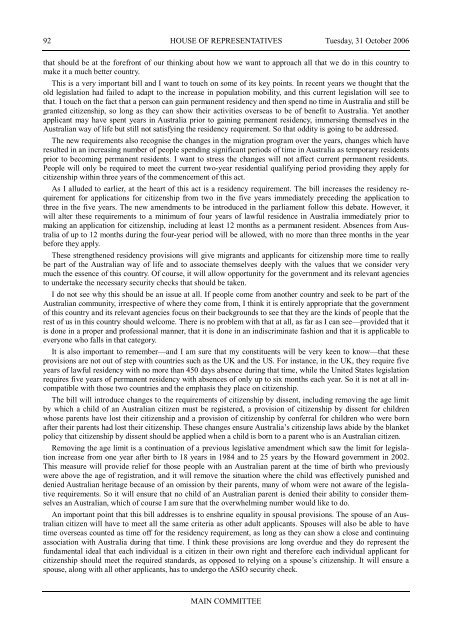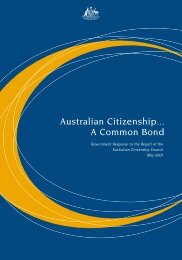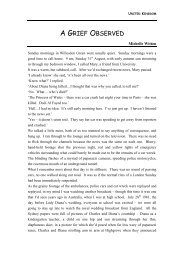HOUSE OF REPRESENTATIVES - The Southern Cross Group
HOUSE OF REPRESENTATIVES - The Southern Cross Group
HOUSE OF REPRESENTATIVES - The Southern Cross Group
Create successful ePaper yourself
Turn your PDF publications into a flip-book with our unique Google optimized e-Paper software.
92 <strong>HOUSE</strong> <strong>OF</strong> <strong>REPRESENTATIVES</strong> Tuesday, 31 October 2006<br />
that should be at the forefront of our thinking about how we want to approach all that we do in this country to<br />
make it a much better country.<br />
This is a very important bill and I want to touch on some of its key points. In recent years we thought that the<br />
old legislation had failed to adapt to the increase in population mobility, and this current legislation will see to<br />
that. I touch on the fact that a person can gain permanent residency and then spend no time in Australia and still be<br />
granted citizenship, so long as they can show their activities overseas to be of benefit to Australia. Yet another<br />
applicant may have spent years in Australia prior to gaining permanent residency, immersing themselves in the<br />
Australian way of life but still not satisfying the residency requirement. So that oddity is going to be addressed.<br />
<strong>The</strong> new requirements also recognise the changes in the migration program over the years, changes which have<br />
resulted in an increasing number of people spending significant periods of time in Australia as temporary residents<br />
prior to becoming permanent residents. I want to stress the changes will not affect current permanent residents.<br />
People will only be required to meet the current two-year residential qualifying period providing they apply for<br />
citizenship within three years of the commencement of this act.<br />
As I alluded to earlier, at the heart of this act is a residency requirement. <strong>The</strong> bill increases the residency requirement<br />
for applications for citizenship from two in the five years immediately preceding the application to<br />
three in the five years. <strong>The</strong> new amendments to be introduced in the parliament follow this debate. However, it<br />
will alter these requirements to a minimum of four years of lawful residence in Australia immediately prior to<br />
making an application for citizenship, including at least 12 months as a permanent resident. Absences from Australia<br />
of up to 12 months during the four-year period will be allowed, with no more than three months in the year<br />
before they apply.<br />
<strong>The</strong>se strengthened residency provisions will give migrants and applicants for citizenship more time to really<br />
be part of the Australian way of life and to associate themselves deeply with the values that we consider very<br />
much the essence of this country. Of course, it will allow opportunity for the government and its relevant agencies<br />
to undertake the necessary security checks that should be taken.<br />
I do not see why this should be an issue at all. If people come from another country and seek to be part of the<br />
Australian community, irrespective of where they come from, I think it is entirely appropriate that the government<br />
of this country and its relevant agencies focus on their backgrounds to see that they are the kinds of people that the<br />
rest of us in this country should welcome. <strong>The</strong>re is no problem with that at all, as far as I can see—provided that it<br />
is done in a proper and professional manner, that it is done in an indiscriminate fashion and that it is applicable to<br />
everyone who falls in that category.<br />
It is also important to remember—and I am sure that my constituents will be very keen to know—that these<br />
provisions are not out of step with countries such as the UK and the US. For instance, in the UK, they require five<br />
years of lawful residency with no more than 450 days absence during that time, while the United States legislation<br />
requires five years of permanent residency with absences of only up to six months each year. So it is not at all incompatible<br />
with those two countries and the emphasis they place on citizenship.<br />
<strong>The</strong> bill will introduce changes to the requirements of citizenship by dissent, including removing the age limit<br />
by which a child of an Australian citizen must be registered, a provision of citizenship by dissent for children<br />
whose parents have lost their citizenship and a provision of citizenship by conferral for children who were born<br />
after their parents had lost their citizenship. <strong>The</strong>se changes ensure Australia’s citizenship laws abide by the blanket<br />
policy that citizenship by dissent should be applied when a child is born to a parent who is an Australian citizen.<br />
Removing the age limit is a continuation of a previous legislative amendment which saw the limit for legislation<br />
increase from one year after birth to 18 years in 1984 and to 25 years by the Howard government in 2002.<br />
This measure will provide relief for those people with an Australian parent at the time of birth who previously<br />
were above the age of registration, and it will remove the situation where the child was effectively punished and<br />
denied Australian heritage because of an omission by their parents, many of whom were not aware of the legislative<br />
requirements. So it will ensure that no child of an Australian parent is denied their ability to consider themselves<br />
an Australian, which of course I am sure that the overwhelming number would like to do.<br />
An important point that this bill addresses is to enshrine equality in spousal provisions. <strong>The</strong> spouse of an Australian<br />
citizen will have to meet all the same criteria as other adult applicants. Spouses will also be able to have<br />
time overseas counted as time off for the residency requirement, as long as they can show a close and continuing<br />
association with Australia during that time. I think these provisions are long overdue and they do represent the<br />
fundamental ideal that each individual is a citizen in their own right and therefore each individual applicant for<br />
citizenship should meet the required standards, as opposed to relying on a spouse’s citizenship. It will ensure a<br />
spouse, along with all other applicants, has to undergo the ASIO security check.<br />
MAIN COMMITTEE




